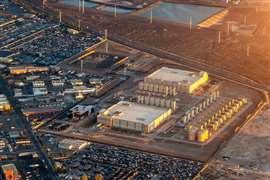EIB plans for the future
11 May 2015
The European Investment Bank (EIB) has said it will maintain “significant lending volumes” from 2015 to 2017, as it publishes its Operational Plan for the period.
The EIB, which is owned by and represents the interests of the European Union (EU) Member States, said it remained well placed to support investment growth, reinforce economic and social cohesion, sustain employment and play a critical role in restoring EU competitiveness.
It said, “We continue to be very responsive to the economic environment and prove our role as the EU Bank, which was underlined with the €10 billion capital increase approved in 2012.”
It said this enabled additional financing of viable investment projects in the range of €180 billion between 2013 and 2015 across the EU, with a focus on projects aiming at sustainable long-term growth and employment.
“We are well on track to deliver, and even exceed, these objectives and will continue our important catalytic role to resolve the current investment and competitiveness challenges in the EU.”
It said its predicted contribution to the Investment Plan for Europe was expected to be supported by an additional guarantee from the EU budget. It felt that an essential part of the partnership put forward by the European Commission was the new European Fund for Strategic Investment (EFSI) in which it said it would play an important role.
The EIB said, “This should be a distinct facility for assets generated by the EIB and backed by the EU budget.”
It said the amounts involved in EFSI were highly significant as they were built on a guarantee of €16 billion from the EU budget, combined with €5 billion contributed from the EIB’s own resources.
“Such resources,” it said, “will back new lending by the EIB Group and unlock investments in the real economy of more than €315 billion over and above what the bank would have otherwise been able to provide.”
Among the activities to be backed by the EIB is urban development and renewal. The bank said it would encourage investment in support of resilient cities and a more resilient urban infrastructure through the deployment of smart technologies that facilitated improvement in the performance of the key infrastructure and associated networks.
It said its lending would, among other things, place an emphasis on encouraging more mixed-use development, to accommodate higher densities and reduce the need for motorised travel. It will also encourage improving individual building performance, to reduce energy consumption and carbon emissions.
It said the pursuit of smart and sustainable cities would need to be coupled with investment in more equitable cities, in which funding for social and affordable housing would play an increasingly important role in EIB financing, with a direct and immediate impact in addressing economic disadvantage and mitigating urban poverty.
Turning to transport, the EIB said the economic crisis had resulted in significant transport investment gaps across Europe, with different needs in different regions.
The internal market is supported by TEN-T (Trans-European Transport Network), and the EIB said that in addition to completing and renewing the core structural networks – which it pointed out were now ageing in many mature economies – there was a need for improved links to ports, airports and urban centres, as well as multi-modal platforms for more efficient freight distribution.




